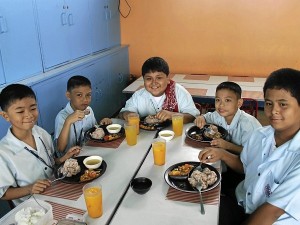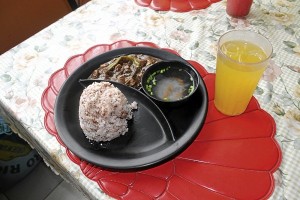School makes kids eat their veggies

Five months ago, the 17-year-old Sophia School in Meycauayan City, Bulacan, decided to offer only vegetables, vegemeat (vegetable fiber made to taste like meat) and fruits in its school canteen. It was a big dietary risk for the canteen, which before was like any other school cafeteria offering regular foods to students.
‘Meatless Monday’
The husband-and-wife team running the school, administrator Lorenzo Abacan and principal Marie Ann Abacan, first tried out a “Meatless Monday” offering in the canteen sometime in October 2011. Lorenzo, a psychologist, and Marie Ann, a nutritionist-dietitian, believe in a holistic health program (mental, spiritual, socio-emotional components) and the nutritional benefits of the plant-based diet. They implemented the plant-based diet program initially through a no-meat-one-day-a-week menu in the canteen.
Thus, every Monday meant not having meat in all meals, only vegetables, vegemeat and other plant-based sources. Neuroscientist Custer Deocaris, founding chair of Meatless Monday Philippines and a balik scientist of the Department of Science and Technology, introduced the couple to the philosophy of Meatless Monday. The school also consulted veteran nutritionist-dietitian Blecenda Varona, a doctor of public health.
Meatless for every day
What was originally planned as just a once-a-week experiment eventually spread out to other schooldays, as well. “What initially was meatless just for a day turned into being meatless almost every day. The reason was that our students, faculty and staff already started to choose and love plant-based meals, despite the presence of meat dishes available from Tuesday to Friday,” Marie Ann says.
Instead of selling sugar-soaked soft drinks, the Sophia School canteen provides only fresh local fruits and juices (dalanghita, mango, watermelon, etc.) and soy milk.
It also serves brown, instead of white, rice. The menu offers vegetarian fare such as congee with tofu bits and boiled rootcrops (gabi, ube and camote). Ann adds that the not-so-popular but equally nutritious rootcrops such as yacon and beets have also been introduced.
She recounts that native/indigenous vegetables like alugbati, malunggay, pechay and kangkong have been added in the preparation of juices, broths and meals (for sautéed mongo, malunggay/kangkong pesto pasta and the like). Frozen vegetarian burgers, nuggets and lumpiang shanghai and ready-to-eat viands like sisig and kare-kare can be brought home for sharing with the students’ household.
Plant-based diet at home
“As a consequence of all of these, some of the parents of our students have told us that their children also urge them to practice at home what they have been doing in our school, particularly the implementation of the plant-based diet,” Marie Ann says.
The school also started implementing bran rice in the canteen, another idea of Deocaris. “This is our second week to implement it with very positive response from our children,” Marie Ann says.
The holistic program, which Lorenzo implements, contains various activities that can improve every aspect of a student’s health, such as quiet time/meditation for the spiritual component; a venue and an activity for emotional self-expression for the socioemotional component; and the opportunity to imbibe optimism and positivism for the mental component.


